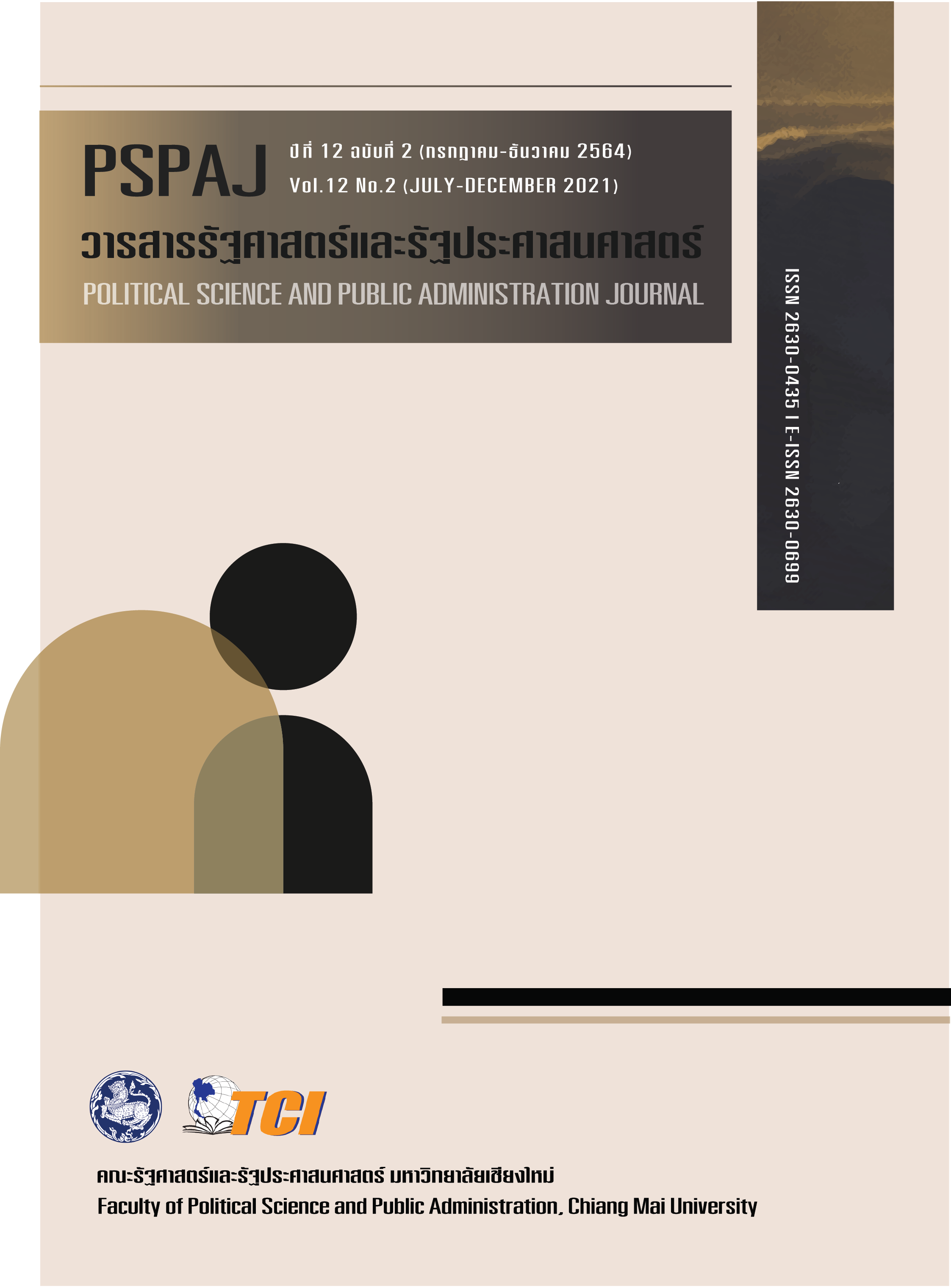A Study of Lao Ethnic Music Conservation and Strategies to Promote Cultural Tourism Using Lao Ethnic Music in Phetchaburi Province
Main Article Content
Abstract
The purposes of this research are 1) to gather knowledge of Lao ethnic music in Phetchaburi province and 2) to find out strategies to promote cultural tourism by using Lao ethnic music in Phetchaburi Province. This research is a qualitative research design. This research uses the in-depth interview with four key informants and the group discussion from nine experts who work related to tourism and culture, community leaders and musicians. The data analysis and descriptive analysis are used in this research. The study indicates that the preservation and inheritance of music culture of the Thai Songdam people in Khaoyoi District, Phetchaburi Province is transferred by the local musical experts. They are usually elders in the community who transfer knowledge and experience to their children or people in the community who really want to study and preserve this kind of culture. Thai Songdam songs are also integrated with the learning activities in the schools. In addition, the songs and music are also written in the form of universal note for recording and collection. When the music of the Lao ethnic group is inherited by Thai Songdam people, Thai government has adopted Lao ethnic group as a component in promoting tourism in the community with the creation of learning resources for ethnic music. In addition, the Lao ethnic music is used as a proactive tourism promotion to draw attention from the tourists. Finally, there is a joint action between the local agencies and people in the community.
Downloads
Article Details
- เนื้อหาและข้อมูลที่ลงตีพิมพ์ในวารสารรัฐศาสตร์และรัฐประศาสนศาสตร์ถือเป็นข้อคิดเห็นและความรับผิดชอบของผู้เขียนบทความโดยตรง ซึ่งกองบรรณาธิการวารสารรัฐศาสตร์และรัฐประศาสนศาสตร์ ไม่จำเป็นต้องเห็นด้วย หรือร่วมรับผิดชอบใดๆ
- บทความและข้อมูล ที่ได้รับการตีพิมพ์ในวารสารรัฐศาสตร์และรัฐประศาสนศาสตร์ ถือเป็นลิขสิทธิ์ของวารสาร หากบุคคลหรือหน่วยงานใดต้องการนำข้อมูลไปใช้ประโยชน์ในทางวิชาการ ขอให้อ้างอิงแหล่งที่มาด้วย
References
การท่องเที่ยวแห่งประเทศ. (ม.ป.ป). ประเภทของการท่องเที่ยว. สืบค้นเมื่อ 2 เมษายน 2562, จาก https://sites.google.com/site/archcommunitydevelopment/tourism
ชนัญ วงษ์วิภาค. (2545). ประโยชน์การท่องเที่ยวเชิงวัฒนธรรม ใน เอกสารการสอนชุดวิชาประสบการณ์วิชาชีพการจัดการท่องเที่ยว. กรุงเทพ: มหาวิทยาลัยสุโขทัยธรรมาธิราช.
ปัญญา รุ่งเรือง. (2552). ดนตรีพิธีกรรม. การนำเสนอในการประชุมทางวิชาการเรื่องดนตรีพิธีกรรม เนื่องในโอกาสครบรอบ 75 ปี มหาวิทยาลัยธรรมศาสตร์และการจัดงานดนตรีไทยอุดมศึกษา ครั้งที่ 37, มหาวิทยาลัยธรรมศาสตร์.
มณีกาญจน เขียวรัตน์. (2553). แนวทางการพัฒนาแหล่งท่องเที่ยวเชิงวัฒนธรรมเป็นเส้นทางการท่องเที่ยวโดยการมีส่วนร่วมของชุมชน กรณีศึกษาอำเภอบ้านผือ จังหวัดอุดรธานี. (บริหารธุรกิจมหาบัณฑิต), มหาวิทยาลัยขอนแก่น.
มธุรส ปราบไพรี. (2549). ศักยภาพของชุมชนในการจัดการแหล่งท่องเที่ยว กรณีชุมชนไทยทรงดำ บ้านเขาย้อย ตำบลเขาย้อย อำเภอเขาย้อย จังหวัดเพชรบุรี. (ศิลปศาสตรมหาบัณฑิต), มหาวิทยาลัยเชียงใหม่.
มนตรี ศรีบุษรา. (2530). ไทยดำรำพัน. กรุงเทพ: บรรณกิจ.
มหาวิทยาลัยราชภัฏเพชรบุรี. (2562). ไทยทรงดำเพชรบุรี. สืบค้นเมื่อ 19 กุมภาพันธ์ 2562, จาก http://arit.pbru.ac.th/localPhet/index.php/lifestyle-phetchaburi/ethnicity-phetchaburi/102-thai-song-dam?showall=1
ราณี อสิชัยกุล. (2546). การท่องเที่ยวเชิงวัฒนธรรม. กรุงเทพ: มหาวิทยาลัยสุโขทัยธรรมาธิราช.
วิภา คงคากุล. (2529). ความสำคัญของดนตรีต่อสังคม. วารสารถนนดนตรี, 1(1), 34-36.
วิลาวัลย์ ปานทอง. (2549). ภาษาและวัฒนธรรมไทยทรงดำ (รายงานการวิจัย). กรุงเทพฯ: มหาวิทยาลัยราชภัฏจันทรเกษม.
ศรัณย์ นักรบ. (2557). ดนตรีชาติพันธุ์วิทยา. กรุงเทพ: มหาวิทยาลัยเกษตรศาสตร์.
สมพร เกษมสุขจรัสแสง. (2526). การผสมทางวัฒนธรรมของลาวโซ่งหรือไทยโซ่ง. สุรินทร์: มหาวิทยาลัยราชภัฏสุรินทร์.
สราวรรณ์ เรืองกัลปวงศ์, และอรรนพ เรืองกัลปวงศ์. (2559). การจัดการการท่องเที่ยวเชิงวัฒนธรรมแบบมีส่วนร่วมของชุมชนเกาะเกร็ด อำเภอปากเกร็ด จังหวัดนนทบุรี. SDU Research, 12(3), 113-132.
สำนักยุทธศาสตร์และการวางแผนเศรษฐกิจมหภาค. (2561). ภาวะเศรษฐกิจไทยไตรมาสที่สี่ ทั้งปี 2561 และแนวโน้มปี 2562. สืบค้นเมื่อ 20 กุมภาพันธ์ 2562, จาก https://www.nesdc.go.th/ewt_dl_link.php?nid=9895&filename=QGDP_report


